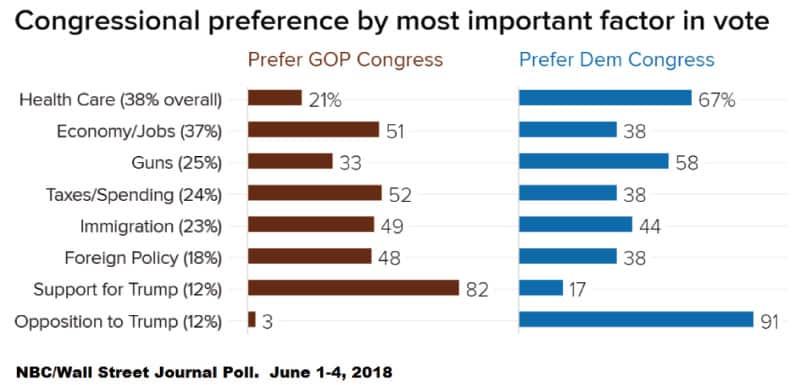In three months, voters will cast their ballots in the midterm elections. Locally, all 15 School Board seats will be on the ballot, although only four are being challenged. The towns of DeQuincy, Westlake and Iowa will choose their mayors, city councils and chiefs of police. Meanwhile, seven candidates are vying to replace retiring City Marshall Joey Alcede. And District 37 (west Calcasieu) will choose a new state representative. At the state level, nine candidates want to be our next Secretary of State.
These elections are important, and voters should become informed and cast their ballots. But they are not “big issue” races that draw a large percentage of voters to the polls. Local voter turnout is likely to be around 40 percent.
The big issue to be decided on Nov. 6 is which party is going to control Congress. There are currently 235 Republicans, 193 Democrats and 7 vacancies in the House of Representatives. Thus, the Democrats need to pick up 25 seats to have a one-vote majority. If that happens, one of the first acts of the new Congress will be to bring articles of impeachment against President Trump. You can bank on it.
How likely are the Democrats to gain control of the House? Right now, it’s a close call. According to Larry Sabato, director of the Center for Politics at the University of Virginia, “the president’s party has lost ground in 36 of 39 House midterms since the Civil War, with an average loss of 33 seats. In the more recent past, since the end of World War II, the average seat loss is 26 seats, or right on the borderline of the 23 net seats the Democrats need to elect a House majority.”
Realclearpolitics.com is currently showing Democrats leading in 199 congressional races and Republicans leading in 202 races, with 35 races judged to be “toss-ups.” (All the Louisiana congressional seats currently held by a Republican are considered safely Republican). If the parties split the toss-up districts, the Democrats will be one vote shy of controlling the House.
In general, without the president at the head of the ticket, midterm congressional elections are dominated by regional and personal issues and turnout is relatively light. An NBC/Wall Street Journal poll in June indicated that only 12 percent of the voters consider support for or opposition to President Trump to be the most important issue in the midterm election. In order for Trump to repeat his stunning presidential victory in 2016, he needs to change that and motivate his base to storm to the polls once more … But that will be tricky.
President Trump will not have the benefit of running against one of the more uninspiring presidential candidates in modern political history, Hillary Clinton; instead, he will be running against 435 Democrat congressional candidates, many of whom are young and energetic. Nor is the Supreme Court a big issue, because if Trump were to be removed from office, Vice President Pence would be just as likely to appoint conservative judges to the highest court.
Moreover, Trump will have trouble holding the Republican coalition together, as some of the issues that motivate his base are opposed by traditional Republicans. And the more he pushes those issues, the more he alienates the traditional Republicans he needs — especially in the Senate.
If President Trump is impeached by Congress, that will not necessarily mean he will be removed from office. It just means there will be a trial in the Senate, where two-thirds of the senators (67) must vote to convict him in order to remove him from office. The Democrats currently have 49 senators, if you include the two “independents” who always vote with the Democrats. And that is not likely to change by more than one or two seats in the midterm election. Thus, a conviction would require the votes of 17 or 18 Republican senators.
I suspect there may be that many Republican senators willing to listen objectively to impeachment charges. But that is a very steep hill to climb. What impeachment does mean is that the national government would be crippled while a trial in the senate dragged on, perhaps for months.
Trump’s greatest hope is that there will be a surprising “red wave” in November driven by a super-strong economy and favorable trade negotiations. But there are a lot of negatives looming out there on the economic front: interest rates are rising, prices are rising, and there are signs the economy may be slowing down rather than speeding up. In addition to that, our international relations are in turmoil with no clear direction; we are going it alone. And Trump is now threatening to shut down the government over immigration policy — a move which usually boomerangs on the party in power.
They say Trump thrives on chaos, but I am not sure the nation does. The Democrats would be foolish to bring impeachment charges against Trump unless they have a very strong reason to believe the Senate will convict him. It would be far too divisive for impeachment to be used just as an opportunity for political grandstanding and playing to the Democrats’ left-wing base. What the nation needs is more unity, less divisiveness and a ratcheting down of the rhetoric on both sides.















Comments are closed.